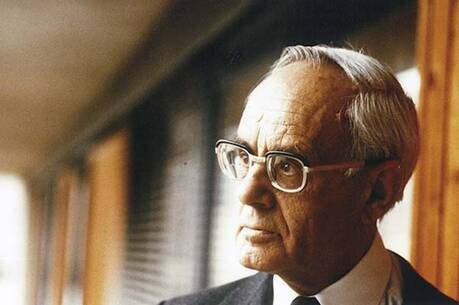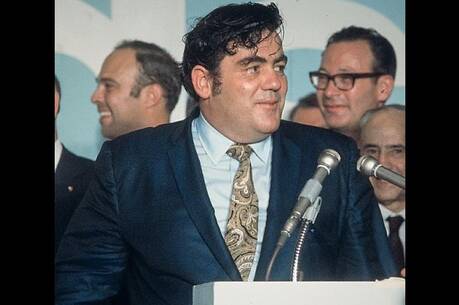Whence Comes Censorship?
Since that declaration, I have been searching for a book describing the battles against government censorship. I have found that book in Christopher Finan’s From the Palmer Raids to the Patriot Act: A History of the Fight for Free Speech in America. Finan, a historian and free speech advocate, has written a book with enormous relevance for post-9/11 America. As the president of the American Booksellers Foundation for Free Expression and chair of the National Coalition Against Censorship, he describes the battles against government censorship from his professional perch as a historian and advocate for civil liberties. “This is the story of our triumph over government censors,” he writes.
Throughout the book, Finan gives credit to the American Civil Liberties Union for its leadership in protecting political speech during wartime, opposing campaigns to censor books and promoting the rights of individuals to “peacefully assemble” to establish labor unions.
During the 1920s, the A.C.L.U. fought for the rights of miners in West Virginia, Colorado and Pennsylvania to organize unions against the financial interests of the Rockefeller and Carnegie families. In the same period, they also fought campaigns by civic organizations to censor reading materials held by public libraries. When a coalition of Protestants and Catholics lobbied the New York State Legislature on behalf of a “clean books” bill, the A.C.L.U. and its allies led the efforts to defeat the legislation. The books targeted for removal from public libraries included Women in Love, by D. H. Lawrence and Ulysses, by James Joyce. The religious denominations judged these books and those like them to be “sexually objectionable.”
A spokesman for the Catholic Church in New York argued that “we must be governed by decent laws even at the risk of being denounced for seeking to impose the will of a group on the majority.”
The A.C.L.U.’s opposition to this censorship campaign was not automatic. In his research, Finan discovered that the A.C.L.U. had to overcome its own “reticence” about defending sexually explicit material. He also credits the federal courts with helping to expand free speech protection after World War II.
When Jersey City’s Democratic mayor, Frank Hague, tried to block union organizers from distributing leaflets informing workers of their rights in 1937, the A.C.L.U. and the union sued in federal court and won.
According to Finan, the greatest number of legal victories were achieved between 1954 to 1969, when the Supreme Court was led by Chief Justice Earl Warren. “The impact of the Warren Court on the right of free speech and freedom of the press has been profound. It expanded artistic freedom, helped ease the abuses of the McCarthy period and encouraged the growth of civil rights.”
The 1964 landmark free-press case of New York Times Co. v. Sullivan produced the ruling that debate on public issues must be “uninhibited, robust and wide-open.” The majority opinion was written by William Brennan, a Catholic. Finan argues that these victories for civil liberties were achieved only after a period of complacency that lasted from before World War I to the beginning of the New Deal. “Prior to World War I,” he notes, “Americans took freedom of speech for granted.”
The conviction and deportation of thousands of Americans between 1919 and 1920 by U.S. Attorney General Mitchell Palmer (hence “Palmer Raids”) for criticizing World War I convinced Americans like Roger Baldwin, the A.C.L.U.’s founder, of the need for an aggressive civil rights organization to combat government abuses. The de-ported and arrested Amer-icans included Emma Goldman and Eugene V. Debs, advocates for free speech and women’s rights.
It was Supreme Court Justice Oliver Wendell Holmes who wrote the majority opinion affirming the government’s right to imprison Debs for making a speech criticizing American participation in World War I. “But the government raids,” according to Finan, “did achieve something important. They raised the issue of what freedoms are protected by the First Amendment.”
The conflict between civil liberties and presidential power would resurface again with the passage of the USA Patriot Act in April 2002. There was growing concern around the country that the federal government would again sacrifice civil liberties to national security, repeating the mistakes made during World War I, World War II and the cold war.
“It had already stirred the ghosts of the Palmer Raids by pulling more than one thousand Muslim men off the street and holding them incommunicado,” Finan notes.
Many individuals and organizations again looked to the A.C.L.U. for leadership and support to combat the warrantless government surveillance of electronic and telephone communications by American citizens.
One of the victories won with A.C.L.U. legal advocacy resulted in a federal court decision that ruled a National Security Agency-sponsored wiretapping program illegal.
“There are no hereditary kings in America and no powers created by the Constitution,” wrote U.S. District Court Judge Anna Diggs Taylor of Detroit. A higher court later overruled Judge Taylor’s decision, Finan points out, “citing an expansive view of presidential power.”
Our constitutional amendments protecting freedom of speech and freedom of the press exist on paper; but according to Christopher Finan, the American people must remain vigilant if we want to keep them. “Perhaps the best explanation for the expansion of free speech,” he writes, “is that over the last century we have learned that it will survive only if we cultivate it. Our constitutional protections and liberties depend on the courage of individuals who fight for their rights.”
This article also appeared in print, under the headline “Whence Comes Censorship?,” in the November 12, 2007, issue.








